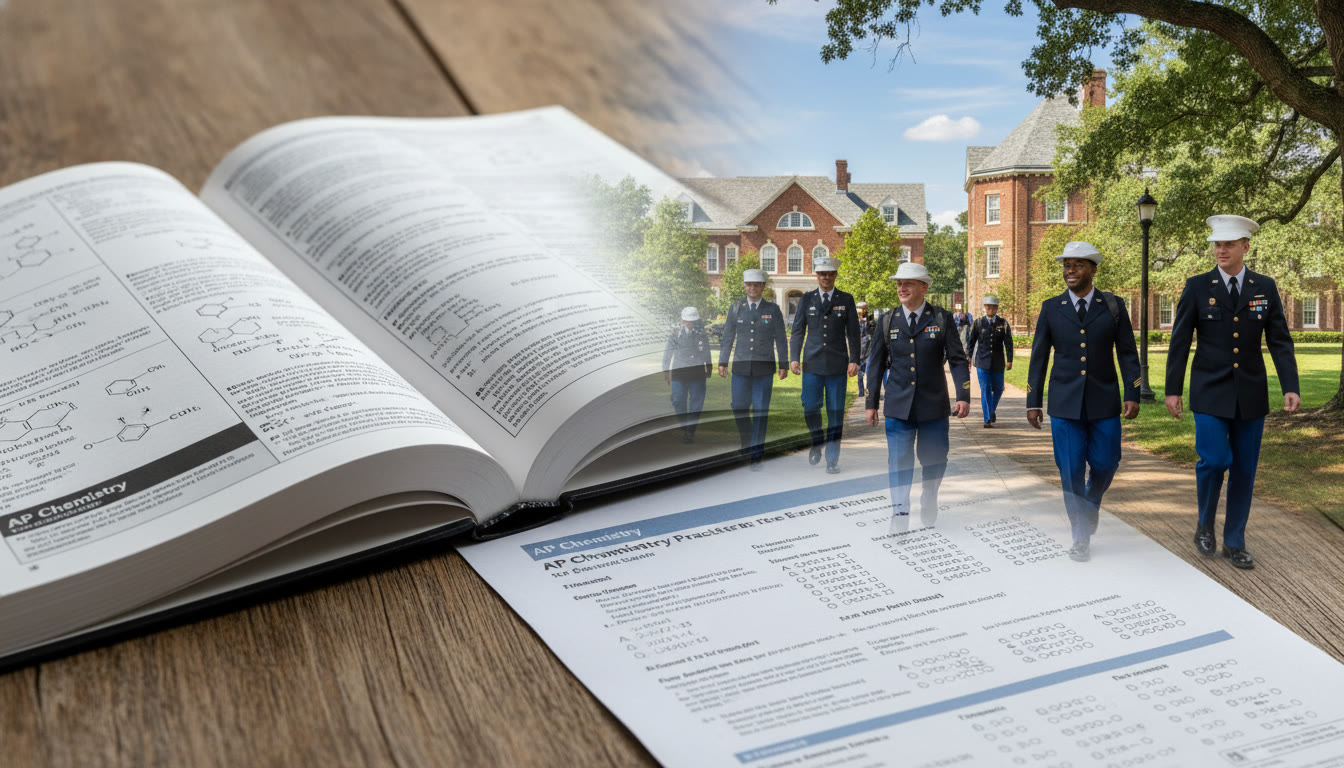Why AP Exams and Validation Tests Matter for Service Academy Hopefuls
If you or your teen is aiming for one of the U.S. service academies — West Point, the Naval Academy, the Air Force Academy, the Coast Guard Academy, or the Merchant Marine Academy — you’re already thinking about more than grades. The admissions process looks for leadership, character, physical readiness, and academic preparation that signals you can handle a rigorous, structured college experience.
Among those academic signals, Advanced Placement (AP) exams and service-academy-specific validation exams (or challenge/placement exams) are important tools. They can demonstrate college-level mastery, strengthen an application, and in many cases, earn you actual college credit or advanced placement once you matriculate. But how do they fit into your strategy? This guide walks you and your family through the why, what, and how — with practical tips for planning, studying, and applying your AP success to the academies’ unique environment.
Core Advantages of AP Exams for Academy Applicants
- Proof of academic readiness: Strong AP scores tell admissions officers you can thrive in college-level courses.
- Potential for credit and placement: High AP scores often translate to credit or the ability to bypass introductory courses, freeing time for advanced subjects or leadership development once you’re admitted.
- Subject specialization: APs in math, science, or engineering highlight STEM preparation — highly relevant for many academy majors.
- Flexibility in your college plan: Credit earned through APs can reduce course load stress during intense training periods or allow you to pursue minors and interdisciplinary studies.

Understanding Validation Exams and Academy Policies
Many academies offer or accept validation exams or placement tests. These are used to confirm that students have the knowledge necessary for certain courses or to grant placement/credit. Policies vary between academies and departments: some accept AP scores directly, some require internal validation, and others combine both approaches.
Important: academy policies on AP credit and validation tests change periodically. Check official academy admissions materials and registrar pages as you near application or matriculation. The general patterns below reflect common practices and how students typically plan around them.
Typical Scenarios You Might Encounter
- Direct AP credit: An academy accepts high AP scores (usually 4 or 5) for course credit or to place you out of introductory classes.
- Placement, not credit: A high AP score lets you place into a higher-level class but not receive credit toward your degree—still valuable for academic planning.
- Validation required: Even with AP scores, some departments administer in-house validation exams to ensure uniform standards across cadets/midshipmen.
- No credit policies: A few programs may not grant credit for APs but still view them favorably in admissions decisions.
Which AP Exams Matter Most for Service Academies?
Thinking strategically about which AP subjects to take will align your high school workload with the academies’ expectations. Here are APs that consistently matter most for applicants, with notes on why they’re valuable.
| AP Exam | Why It Matters | How It Helps at an Academy |
|---|---|---|
| AP Calculus AB / BC | Demonstrates strong quantitative reasoning and calculus readiness. | Can lead to placement in higher-level engineering or math courses; BC often yields more credit. |
| AP Physics 1 / 2 / C | Shows ability to handle rigorous physics and problem solving; C versions include calculus. | Valuable for engineering, aerospace, and physical science majors; may allow skipping introductory labs. |
| AP Chemistry | Signals lab experience, chemical reasoning, and lab-report literacy. | Useful for majors involving chemistry, biology, or materials science; might affect lab placement. |
| AP Computer Science A | Shows programming foundations and logical structuring of problems. | Helps with computer science, cyber, and systems courses; useful for internships and projects. |
| AP English Language / Literature | Demonstrates writing, analysis, and communication skills. | Strong writing skills are essential for officer development and coursework; may grant composition credit. |
| AP Statistics | Indicates ability with data analysis and statistical reasoning. | Increasingly useful across majors and research projects; may place you into advanced electives. |
How to Prioritize APs by Major and Mission
If you’re leaning toward an engineering, physics, or aerospace path, prioritize Calculus and AP Physics C. Interested in cybersecurity or software? AP Computer Science A and Calculus AB or BC are strong picks. For leadership, policy, or humanities tracks, AP English and history courses help sharpen communication and critical thinking.
Preparing for AP Exams and Validation Tests: A Practical Timeline
Planning is everything. A structured approach starting in sophomore or junior year gives you time to build subject mastery without burnout. Below is a timeline model you can adapt to your school calendar and application deadlines.
Sophomore Year
- Explore AP course offerings and talk with counselors about which classes align with academy prerequisites and your interests.
- Start foundational coursework: precalculus, chemistry, physics, or basic programming depending on your chosen path.
- Build a lightweight AP plan — maybe one AP next year — to gain experience with AP-level work.
Junior Year
- Take 1–3 AP courses, focusing on Calculus, Physics, Chemistry, or English depending on your major lean.
- Register for AP Exams in the fall/spring per your school’s timeline and practice with released free-response questions.
- Begin academy-specific preparation: physical fitness, leadership activities (ROTC, community service), and research on each academy’s validation/placement policies.
Senior Year
- Take any remaining APs you need; aim for high scores (4–5) on exams that academies value for placement or credit.
- If an academy requires or offers validation exams, plan to take them per the registrar’s timeline (often during orientation or early matriculation, though some academies allow earlier testing).
- Use AP credits strategically: if an academy awards credit after admission, confirm what courses you could skip and how that affects scholarship, room/board, or academic trajectories.
Study Strategies That Actually Work (Not Just Busywork)
AP exams test reasoning and application, not just memorization. Validation exams at academies often emphasize the same fundamentals, so the skills you build for APs carry over. Here are study habits that provide real results.
Make Skill-Based Blocks
- Break study sessions into focused skill blocks: problem solving (45–60 minutes), concept review (30 minutes), and practice questions (30 minutes).
- For math and physics, practice problem sets under timed conditions to simulate both AP and placement test pressure.
Use Released Practice Materials
College Board releases past free-response questions and scoring guidelines. Work these problems, then compare your answers to the scoring rubrics. For validation, find academy-provided practice problems or departmental syllabi to align your study with their expectations.
Active Revision Beats Passive Review
- Teach a concept to someone else or record yourself explaining a solution; this reveals gaps in understanding.
- Build cheat sheets for formulas and problem frameworks — but only after you can solve problems without them.
Mock Exams and Feedback Loops
Full-length practice exams are the best predictor of performance. Time yourself and score strictly. Then, analyze every mistake to find patterns. Over time, you’ll see the same weaknesses recur; target them specifically.
How to Present AP Scores in Your Academy Application
Your application should tell a coherent story. AP scores can be shown in multiple places — as evidence of academic rigor on your transcript, in your résumé detailing coursework, and in optional academic addenda if you want to explain advanced placements.
Tips for Clear Presentation
- List AP Coursework on your résumé with the year taken and exam score (if released).
- In essays, reference AP experiences when they shaped an academic interest (e.g., a lab project in AP Chemistry that led you to pursue materials science).
- If you received a high score on an AP that’s directly relevant to your major, mention how that allowed you to focus on advanced topics in senior year or during internships.
When AP Credit Arrives: Academic Planning Once You’re Accepted
Getting credit or placement is only the start — how you use it matters. Many cadets and midshipmen find strategic advantages in using AP credit to take on double majors, pursue minors, or free up time for leadership development and research.
Decision Points You’ll Face
- Take the advanced class: If placement skips an intro course, consider moving into the more advanced option to keep your trajectory aligned with your major.
- Accept credit and lighten load: If early semesters are demanding, accepting credit can ease your schedule, especially during intensive military training periods.
- Use credit for electives: Use the freed credit space to explore electives that broaden your perspective — history, economics, or languages are often useful for future officers.
Real-World Examples and Mini Case Studies
Here are compact, realistic scenarios that show how AP results and validation tests were used by successful academy entrants.
Case 1: The Future Engineer
Jordan came in with AP Calculus BC and AP Physics C scores of 5. The academy granted placement into second-year engineering math and physics. With that extra space, Jordan took an early robotics elective and joined a research lab the first summer — experiences that later led to a competitive internship and a strong performance review from faculty.
Case 2: The Policy-Minded Leader
Maria’s AP English Language score of 4 and AP U.S. History score of 5 demonstrated writing and analytic strength. The academy didn’t grant much technical credit, but her ability to write well and analyze primary documents helped her shine in leadership essays and class discussions. She used elective space (freed by another AP in math) to study international relations.
Case 3: The Cybersecurity Path
Kevin took AP Computer Science A and AP Calculus AB, scoring 5s in both. He received placement into an advanced introductory programming course and used extra time to pursue lab-based cybersecurity training, positioning him for a summer program and later service with technical specialties.
Resources and Support: When to Get Help (and What Kind)
You don’t have to do this alone. Good support can make your prep efficient and targeted. Here’s what to look for as you seek tutoring, mock exams, or structured plans.
Types of Support That Pay Off
- One-on-one tutoring: Personalized coaching helps you target weak spots and develop problem-solving habits rather than generic advice.
- Structured study plans: A timeline that maps practice tests, content review, and rest prevents burnout and improves retention.
- Expert tutors: Look for tutors with subject mastery and experience guiding students through AP and validation exam types.
For many families, a blend of in-person mentorship, targeted online practice, and occasional professional review is the most effective approach. Services that combine tailored study plans, expert tutors, and AI-driven insights can accelerate progress by focusing practice on precise weaknesses — for example, adaptive question sets that concentrate on the types of AP free-response prompts you miss most. If you’re exploring help, consider options that allow for 1-on-1 guidance and a clear roadmap tied to test dates and academy validation timelines.
Common Questions Parents and Students Ask
Do I need perfect AP scores to get into a service academy?
No. Academies evaluate the whole applicant: leadership, recommendations, physical readiness, and academic rigor. Strong AP scores help, but they’re one piece of a broader application puzzle.
Should I take many APs or focus deeply on a few?
Depth trumps breadth. A few high-level AP scores (4 or 5) in subjects relevant to your intended major typically have more impact than a wider set of mediocre scores. Admissions and academy departments value depth and mastery, especially in STEM if you’re pursuing an engineering path.
If I get AP credit, will I graduate earlier?
Sometimes, but not always. Academies have specific curricular requirements tied to military and professional training that may affect whether AP credits translate into fewer semesters. More commonly, AP credit frees space for additional majors, minors, or research experiences.
Final Checklist: A Practical Action Plan
- Decide which academies you’ll apply to and review each school’s AP and validation exam policies early.
- Create a prioritized AP plan: which courses to take, exam timing, and backup schedules if you need to repeat or strengthen a subject.
- Use released AP free-response questions for practice and simulate full exams under timed conditions.
- Plan for validation exams by reviewing departmental syllabi and practicing similar problems where available.
- Consider tailored support: 1-on-1 tutoring and tailored study plans can optimize study time and target weak areas. Services that pair expert tutors with adaptive practice and AI-driven analytics can speed improvement — especially in high-stakes subjects like Calculus and Physics.
- After admission, meet with your academy’s registrar or academic advisor to confirm how AP credit and placement will be applied to your degree plan.

Parting Thoughts: Make APs Work for Your Mission
AP exams and academy validation tests are powerful ways to communicate academic readiness and shape your early college experience. They won’t replace character, leadership, physical fitness, or recommendation letters — all of which the service academies weigh heavily — but they will give you practical advantages: demonstrated mastery, potential credits, and the ability to pursue advanced or specialized opportunities once you arrive on campus.
Plan early, focus deeply on subjects that align with your goals, and use targeted support when it accelerates learning. With the right strategy, your AP efforts become more than test scores — they’re stepping stones to the leadership, technical expertise, and service career you envision.
Good luck. The path to a service academy is demanding, rewarding, and life-changing. Take it one focused step at a time, and lean on strong preparation — and, when it fits, personalized tutoring and tailored study plans to get you where you want to go.

















No Comments
Leave a comment Cancel